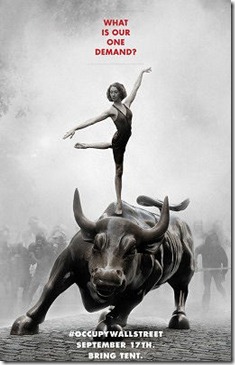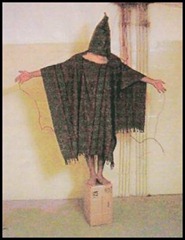From Paul Krugman:
There’s something happening here. What it is ain’t exactly clear, but we may, at long last, be seeing the rise of a popular movement that, unlike the Tea Party, is angry at the right people. When the Occupy Wall Street protests began three weeks ago, most news organizations were derisive if they deigned to mention the events at all. For example, nine days into the protests, National Public Radio had provided no coverage whatsoever. It is, therefore, a testament to the passion of those involved that the protests not only continued but grew, eventually becoming too big to ignore. With unions and a growing number of Democrats now expressing at least qualified support for the protesters, Occupy Wall Street is starting to look like an important event that might even eventually be seen as a turning point.  What can we say about the protests? First things first: The protesters’ indictment of Wall Street as a destructive force, economically and politically, is completely right. A weary cynicism, a belief that justice will never get served, has taken over much of our political debate — and, yes, I myself have sometimes succumbed. In the process, it has been easy to forget just how outrageous the story of our economic woes really is. So, in case you’ve forgotten, it was a play in three acts. In the first act, bankers took advantage of deregulation to run wild (and pay themselves princely sums), inflating huge bubbles through reckless lending. In the second act, the bubbles burst — but bankers were bailed out by taxpayers, with remarkably few strings attached, even as ordinary workers continued to suffer the consequences of the bankers’ sins. And, in the third act, bankers showed their gratitude by turning on the people who had saved them, throwing their support — and the wealth they still possessed thanks to the bailouts — behind politicians who promised to keep their taxes low and dismantle the mild regulations erected in the aftermath of the crisis. Given this history, how can you not applaud the protesters for finally taking a stand? Now, it’s true that some of the protesters are oddly dressed or have silly-sounding slogans, which is inevitable given the open character of the events.
What can we say about the protests? First things first: The protesters’ indictment of Wall Street as a destructive force, economically and politically, is completely right. A weary cynicism, a belief that justice will never get served, has taken over much of our political debate — and, yes, I myself have sometimes succumbed. In the process, it has been easy to forget just how outrageous the story of our economic woes really is. So, in case you’ve forgotten, it was a play in three acts. In the first act, bankers took advantage of deregulation to run wild (and pay themselves princely sums), inflating huge bubbles through reckless lending. In the second act, the bubbles burst — but bankers were bailed out by taxpayers, with remarkably few strings attached, even as ordinary workers continued to suffer the consequences of the bankers’ sins. And, in the third act, bankers showed their gratitude by turning on the people who had saved them, throwing their support — and the wealth they still possessed thanks to the bailouts — behind politicians who promised to keep their taxes low and dismantle the mild regulations erected in the aftermath of the crisis. Given this history, how can you not applaud the protesters for finally taking a stand? Now, it’s true that some of the protesters are oddly dressed or have silly-sounding slogans, which is inevitable given the open character of the events.  But so what? I, at least, am a lot more offended by the sight of exquisitely tailored plutocrats, who owe their continued wealth to government guarantees, whining that President Obama has said mean things about them than I am by the sight of ragtag young people denouncing consumerism. Bear in mind, too, that experience has made it painfully clear that men in suits not only don’t have any monopoly on wisdom, they have very little wisdom to offer. When talking heads on, say, CNBC mock the protesters as unserious, remember how many serious people assured us that there was no housing bubble, that Alan Greenspan was an oracle and that budget deficits would send interest rates soaring. A better critique of the protests is the absence of specific policy demands. It would probably be helpful if protesters could agree on at least a few main policy changes they would like to see enacted. But we shouldn’t make too much of the lack of specifics. It’s clear what kinds of things the Occupy Wall Street demonstrators want, and it’s really the job of policy intellectuals and politicians to fill in the details. Rich Yeselson, a veteran organizer and historian of social movements, has suggested that debt relief for working Americans become a central plank of the protests. I’ll second that, because such relief, in addition to serving economic justice, could do a lot to help the economy recover. I’d suggest that protesters also demand infrastructure investment — not more tax cuts — to help create jobs.
But so what? I, at least, am a lot more offended by the sight of exquisitely tailored plutocrats, who owe their continued wealth to government guarantees, whining that President Obama has said mean things about them than I am by the sight of ragtag young people denouncing consumerism. Bear in mind, too, that experience has made it painfully clear that men in suits not only don’t have any monopoly on wisdom, they have very little wisdom to offer. When talking heads on, say, CNBC mock the protesters as unserious, remember how many serious people assured us that there was no housing bubble, that Alan Greenspan was an oracle and that budget deficits would send interest rates soaring. A better critique of the protests is the absence of specific policy demands. It would probably be helpful if protesters could agree on at least a few main policy changes they would like to see enacted. But we shouldn’t make too much of the lack of specifics. It’s clear what kinds of things the Occupy Wall Street demonstrators want, and it’s really the job of policy intellectuals and politicians to fill in the details. Rich Yeselson, a veteran organizer and historian of social movements, has suggested that debt relief for working Americans become a central plank of the protests. I’ll second that, because such relief, in addition to serving economic justice, could do a lot to help the economy recover. I’d suggest that protesters also demand infrastructure investment — not more tax cuts — to help create jobs.  Neither proposal is going to become law in the current political climate, but the whole point of the protests is to change that political climate. And there are real political opportunities here. Not, of course, for today’s Republicans, who instinctively side with those Theodore Roosevelt-dubbed “malefactors of great wealth.” Mitt Romney, for example — who, by the way, probably pays less of his income in taxes than many middle-class Americans [and believes corporations are people] — was quick to condemn the protests as “class warfare.” But Democrats are being given what amounts to a second chance. The Obama administration squandered a lot of potential good will early on by adopting banker-friendly policies that failed to deliver economic recovery even as bankers repaid the favor by turning on the president. Now, however, Mr. Obama’s party has a chance for a do-over. All it has to do is take these protests as seriously as they deserve to be taken. And if the protests goad some politicians into doing what they should have been doing all along, Occupy Wall Street will have been a smashing success. They’ve even reached Utah, the redest of red states:
Neither proposal is going to become law in the current political climate, but the whole point of the protests is to change that political climate. And there are real political opportunities here. Not, of course, for today’s Republicans, who instinctively side with those Theodore Roosevelt-dubbed “malefactors of great wealth.” Mitt Romney, for example — who, by the way, probably pays less of his income in taxes than many middle-class Americans [and believes corporations are people] — was quick to condemn the protests as “class warfare.” But Democrats are being given what amounts to a second chance. The Obama administration squandered a lot of potential good will early on by adopting banker-friendly policies that failed to deliver economic recovery even as bankers repaid the favor by turning on the president. Now, however, Mr. Obama’s party has a chance for a do-over. All it has to do is take these protests as seriously as they deserve to be taken. And if the protests goad some politicians into doing what they should have been doing all along, Occupy Wall Street will have been a smashing success. They’ve even reached Utah, the redest of red states:














